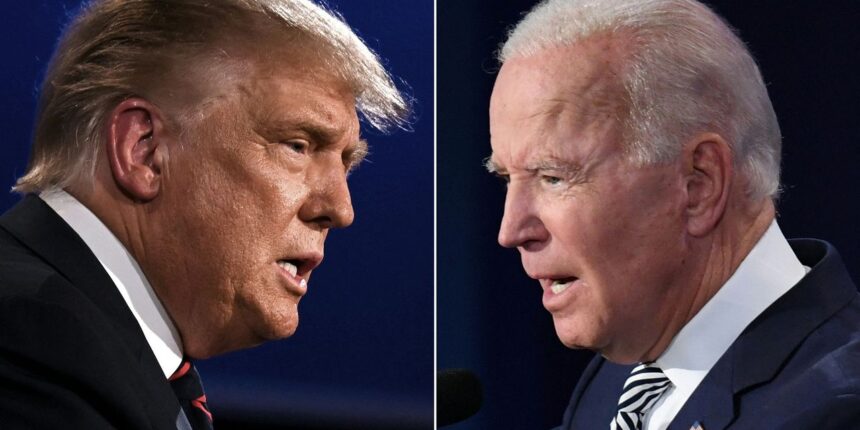A third-party candidate could win the presidency if the major parties offer voters a Biden-Trump rematch.
Like President Joe Biden, Republican President George H.W. Bush was bragging about great job creation at the time, but Americans were dissatisfied with his economy.
Much as they do in the case of Donald Trump, the Republican former president, voters three decades ago had questions about the character of Bush’s Democratic challenger, Bill Clinton, because of his draft record, rumors of extramarital affairs and Hillary Clinton’s law practice’s dealings with the state of Arkansas.
These days, radicalized voting blocs within each major party and Congress are creating a winner-take-all attitude toward crafting public policy, paralyzing progress. Frustrated, many Americans are increasingly disenchanted with our two-party system, at least one poll suggests.
An increasing number don’t view either major party as adequately reflecting their views. Political-science research indicates that, if we had a parliamentary system, the two major parties would fracture into five or six — a progressive Bernie Sanders/Alexandria Ocasio-Cortez party; a center-left Biden party; a center/business-oriented Michael Bloomberg party; a traditional-conservative Mike Pence party; a conservative-populist Trump party; and, perhaps, a Green Party focused on climate change.
Governments would be formed by cobbling coalitions, and, in many ways, Biden essentially has done that. After defeating Sanders and other progressives by projecting himself as a moderate in the 2020 primaries, Biden embraced some priorities of the progressive left, such as student-loan forgiveness.
Now, Biden’s governing agenda is as great an albatross as the 80-year-old’s age. A male at 82 has 1 in 3 chance of dying over a 4-year period and there’s also the chance he could become impaired in some way.
Vice President Kamala Harris inspires little confidence, but she symbolizes progressives’ commitment to racial and social justice. Dropping her from the ticket would alienate hard-left voters and could inspire enough of them to simply not vote to cost him the election.
After getting much of his agenda through Congress, deficits are at record levels, inflation is too high, wages have not kept up and the president gets poor marks on the economy. His job-approval ratings are lower than a snake’s belly, though comparable to other recent presidents at the same point in their first term.
According to a recent Economist/YouGov Poll, 43% of Americans feel a third major political party is necessary vs. 29% who say it’s not, and 44% say they could vote for an independent candidate, while only 25% say no.
No Labels, with co-chairs including prominent progressive Ben Chavis, former Senator Joe Lieberman, who was the Democrats’ vice presidential nominee in the 2000 election, as well as former GOP governors Larry Hogan, of Maryland, and Pat McCrory, of North Carolina, is planning a convention next spring — after the March primaries. The group has faced criticism from some about its failure to identify its funding sources. Still, if a Biden-Trump rematch is the offing, they could engineer a campaign with a centrist ticket — for example, Republican Gov. Chris Sununu of New Hampshire and Democratic Sen. Joe Manchin of West Virginia.
Americans, after COVID, ballooning deficits and inflation, want a dialogue based on unity, not more pain. What the GOP House majority and Biden’s West Wing likely can’t tolerate, is an agenda for One America.
Americans could be persuaded they can’t get everything their various factions may want — immigration restrictions and labor-force needs, abortion and protection of the unborn, affirmative action and merit-only based hiring and admissions, student loans/childcare and low taxes — but a presidency premised on fostering a sense of national purpose and simply compelling factions to compromise on major issues is absolutely necessary.
For example, the federal government, with limited resources, faces tough trade-offs between defense spending/security challenges posed by Russia, China, Iran and others and social programs. Consolidating income support for families — such as the child tax credit, earned-income tax credit, food stamps and the like into a single payment system could be less expensive and provide families with more resources.
We can’t have a winner-take-all presidency that is either anti-woke or reduces all issues to race, gender and historical injustices.
A third-party candidate could win a plurality in the popular vote but not likely a majority of electoral votes. That would send the election to the House, where each state delegation gets one vote, and the Republicans have the edge.
But with enough GOP House members likely uneasy about Trump as president again, no one may win a majority on the first ballot. Then, as the election of John Quincy Adams demonstrated, the horse trading begins, and anything can happen.
A unity ticket like Sununu and Manchin starts looking pretty good to form a centrist cabinet drawn from both parties.
Peter Morici is an economist and emeritus business professor at the University of Maryland, and a national columnist.








